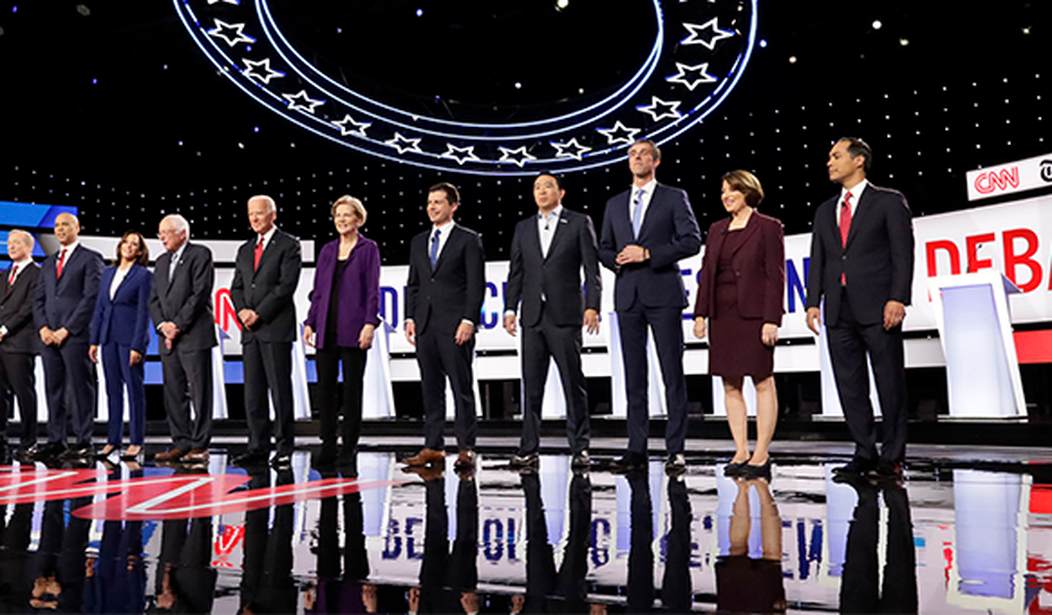The world's oldest political party set an all-time record Tuesday night, with 12 presidential candidates on a single stage in Westerville, Ohio. That's a suburb of Columbus, the fastest-growing big metro area in the Midwest, in Franklin County, which voted Republican in every presidential election but one for a half century (1944-92) but has voted Democratic in the six elections since.
It's an apt location for a party increasingly dependent on and dominated by white college-graduate voters, even as it has lost ground in heartland factory towns and blue-collar precincts.
As I argue in my just-published book, "How America's Political Parties Change (And How They Don't)," the Democratic Party has, since its founding in 1832, been a coalition of out-groups, of people who are considered atypical Americans but can, if they stick together, be a national majority.
But holding these disparate groups together can be tricky, since they often disagree on important issues. Poignant example: flailing candidate Beto O'Rourke's insistence on denying tax exemptions to churches that don't support same-sex marriage.
That could close down lots of historically black churches, Orthodox synagogues and Muslim mosques. So you have a clear-cut disagreement between two overwhelmingly Democratic constituencies: secular-minded white college grads and traditionally religious black church members.
National Democrats, eager to include even splinter groups, concocted rules allowing candidates polling at only 2 percent on the debate stage -- which incentivizes those with little support to attack a front-runner. In the first three debates, the target was Joe Biden. In Westerville, it was Elizabeth Warren.
Recommended
Warren's support comes disproportionately from white college grads, and her "I have a plan for that" proposals, while theoretically aimed at those with modest incomes, have appealed mostly to the upscale. But her specificity vanishes when it comes to the price tag for her version of Bernie Sanders' original "Medicare for All."
Pete Buttigieg, doing well with high-education Iowans, challenged her stubborn, Trump-like refusal to admit, as Sanders does, that middle-class "taxes will go up." "No plan has been laid out to explain how a multitrillion-dollar hole in this Medicare for All plan that Senator Warren is putting forward," the South Bend mayor said in his attack. "I'm sorry, Elizabeth," Amy Klobuchar, who hasn't clicked in the polls, chimed in. "I think we owe it to the American people to tell them where we're gonna send the invoice."
The closest Warren came to responding was when she said, "(C)osts will go up for the wealthy and for big corporations, and for hard-working middle-class families, costs will go down." She shows obvious relish in proposing a 3% wealth tax on the very rich as well as federal and worker oversight of large corporations. It's "wokenomics," said liberal commentator Van Jones.
But that "urge to punish" -- a phrase from the New York Post's Michael Goodwin -- can seem unattractive and may repel otherwise-liberal voters in the most affluent suburbs, where Sanders support flagged four years ago.
Going into the debate, Warren looked well positioned to gobble up votes that had gone to Sanders before his Oct. 1 heart attack. But while Warren was pushed on the defensive, Sanders spoke loudly and vigorously, and he's scheduled to be endorsed by freshmen Reps. Alexandria Ocasio-Cortez, Rashida Tlaib and Ilhan Omar over the weekend. It looks like Warren will continue to face strong opposition from the socialist left.
Other Democrats were tussling over other issues that tend to pit one Democratic constituency against another. Cory Booker backed taxpayer-paid abortions while Tulsi Gabbard, echoing 1990s Bill Clinton, said abortion should be "safe, legal and rare." Buttigieg, while rejecting Medicare for All, praised the assault weapons ban and called for packing the Supreme Court, which Biden loudly opposed.
For two generations, Democrats have been skeptical about many military interventions and usually supportive of free speech. At this debate, Biden and Buttigieg decried President Donald Trump's Syria troop withdrawal over Gabbard's strong disagreement. For reasons that remain unclear, Kamala Harris repeated her call for Twitter to close down Trump's account -- something many Republicans wish had been done some time ago but that suggests a disturbing relish for suppressing speech. Joe Biden was questioned, gingerly, about his son Hunter Biden's $600,000 Ukrainian gas company gig -- a subject Democrats and NBC anchors seem desperate to avoid.
Last week, I wrote that Elizabeth Warren was the Democrats' faute de mieux front-runner. We're still waiting to see who, if anyone, is mieux.
Michael Barone is a senior political analyst for the Washington Examiner, resident fellow at the American Enterprise Institute and longtime co-author of The Almanac of American Politics.
























Join the conversation as a VIP Member